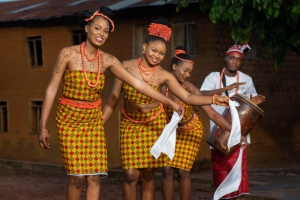Introduction
Madagascar is a country of rich traditions, diverse cultures, and deep-rooted customs that shape daily life. Understanding and respecting local etiquette can enhance your travel experience and help you connect with Malagasy people in a meaningful way. Whether you’re exploring bustling markets, visiting remote villages, or engaging with locals, here’s what you need to know about customs and etiquette in Madagascar.
1. Greetings & Social Etiquette
✅ Handshakes and Verbal Greetings: A handshake is the most common form of greeting, often accompanied by a warm smile. In rural areas, a two-handed shake or a light touch on the wrist is a sign of respect.
✅ Using Titles: When addressing someone, especially elders or authority figures, it is polite to use titles such as “Monsieur” (Mr.) or “Madame” (Mrs.) before their name. In Malagasy, you may hear “Razana” or “Ramose” used to show respect.
✅ Polite Conversation: Malagasy people appreciate politeness. A friendly “Salama” (Hello) or “Miarahaba” (Formal greeting) goes a long way in making a good impression.
✅ Smiling & Eye Contact: A warm smile is valued, but direct eye contact with elders or superiors should be brief to show humility.
2. The Concept of “Fady” (Sacred Taboos)
Fady are traditional taboos or cultural restrictions that vary by region, tribe, and even individual families. They are taken seriously and should be respected to avoid offending locals.
🚨 Common Examples of Fady:
❌ Pork Restrictions: In some areas, particularly among the Antandroy and some Sakalava groups, pork is considered fady. Avoid eating or discussing it in these regions.
❌ Pointing at Graves: It is considered highly disrespectful to point at tombs or sacred sites. If you need to indicate something, use an open hand instead of your index finger.
❌ Swimming in Certain Lakes & Rivers: Some bodies of water are sacred and off-limits for swimming. Always ask a local guide before entering any water.
❌ Wearing Red Near Certain Sacred Sites: In some regions, wearing red is forbidden in sacred areas, as it is associated with spirits.
🛑 Important Tip: If you are unsure whether something is fady, ask a local guide or respectfully follow the behavior of the community.
3. Respect for Elders & Authority
✅ Elders are highly respected: Malagasy society places strong emphasis on respecting older people. If you’re invited into someone’s home, greet the eldest person first.
✅ Seeking Permission Before Taking Photos: Always ask for permission before photographing people, villages, or sacred sites, as some communities believe photos can steal one’s spirit.
✅ Accepting Gifts or Food: If offered food or a gift, it is polite to accept it with both hands as a sign of gratitude.
4. Dress Code & Modesty
Madagascar is generally conservative in terms of dress, and it is important to dress appropriately, especially in rural areas.
👕 General Dress Code:
✅ Casual, modest clothing is recommended. Avoid overly revealing outfits, especially in villages and religious sites.
✅ Women should avoid short skirts and low-cut tops. In rural areas, covering shoulders and wearing a long skirt (lamba) is appreciated.
✅ Men should avoid walking shirtless in towns or villages.
🌊 Beachwear Etiquette:
✅ Bikinis and shorts are acceptable at tourist beaches, but when walking in villages near the coast, covering up with a light sarong or t-shirt is advised.
5. Visiting Homes & Villages
If you are invited into a Malagasy home or village, follow these customs to show respect:
✅ Bring a small gift: Offering a small present, such as fruit, sugar, or rice, is a kind gesture when visiting someone’s home.
✅ Remove your shoes: In many homes, removing shoes before entering is a sign of cleanliness and respect.
✅ Eat only after being invited: Even if food is served, wait for your host to invite you to eat before starting.
🏡 Village Customs: If visiting a remote village, it is polite to greet the village elder first and seek permission before exploring or taking photos.
6. Dining Etiquette
When eating with locals, keep these dining customs in mind:
✅ Wash hands before meals: Many Malagasy meals are eaten with hands, especially in rural areas. Handwashing before and after eating is customary.
✅ Wait for the eldest to start eating: In traditional settings, the most senior person at the table begins the meal first.
✅ Sharing food is common: If someone offers you food, it is polite to accept, even if just a small portion.
✅ Right hand rule: When eating with hands, use your right hand only, as the left hand is considered unclean.
🍛 Traditional Malagasy Foods to Try:
- Romazava: A beef and leafy greens stew, often considered Madagascar’s national dish.
- Ravitoto: Mashed cassava leaves cooked with pork or beef.
- Vary amin’anana: Rice with greens, a staple meal across the country.
- Koba: A sweet banana and peanut cake wrapped in banana leaves.
7. Religion & Spiritual Beliefs
Madagascar has a mix of Christianity, Islam, and traditional ancestor worship. Many Malagasy people believe in honoring their ancestors (Razana) through rituals, music, and famadihana (turning of the bones ceremony).
✅ Respect sacred sites: If visiting a tomb or shrine, show respect by dressing modestly and following local customs.
✅ Attend a church service if invited: Christianity is widely practiced, and church services are important community gatherings. If invited, it’s a great way to experience local culture.
8. Language & Communication
Although French and Malagasy are the most widely spoken languages, English is also used in some tourist areas.
✅ Common Malagasy Phrases to Know:
- Hello: Salama
- Thank you: Misaotra
- Please: Azafady
- Goodbye: Veloma
- How much is this? Ohatrinona ity?
🚀 Pro Tip: Learning a few words in Malagasy can go a long way in showing respect and making connections with locals!
9. Tipping & Bargaining Etiquette
💰 Tipping: While not mandatory, tipping is appreciated in restaurants, hotels, and for guides.
✅ Restaurants: 5-10% of the bill is a generous tip.
✅ Tour guides & drivers: $5-$10 per day is a fair amount.
✅ Porters & hotel staff: Small tips of 2,000–5,000 Ariary are appreciated.
🛍️ Bargaining in Markets: Haggling is expected at local markets, but always do so with a smile and respect—it’s part of the culture!
Conclusion
Understanding Madagascar’s local customs and etiquette will not only enhance your experience but also help you build positive connections with the people you meet. By showing respect, learning a few Malagasy phrases, and being mindful of cultural taboos, you can enjoy a deeper and more rewarding travel experience in this unique island nation.
Final Tip: Embrace the Malagasy way of life—slow down, be open to new experiences, and always approach situations with a friendly attitude. Misaotra & Veloma! (Thank you & Goodbye!)







